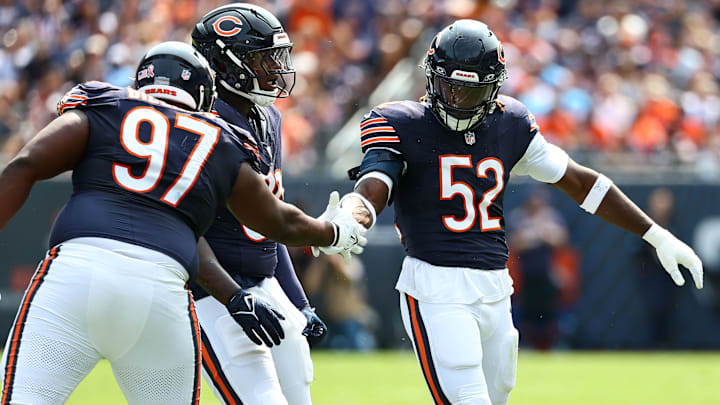How Bears Did at Answering the Big Questions They've Faced

From the time the first offseason work began for the Bears, they faced several big questions cloaked in the shadows.
The shadow cast over these, of course, was the Caleb Williams question. They had to find out if they had a rookie quarterback starter who could win.
However, this is a question they'll face all year long. It's obvious they'll probably still have questions by the time the season ends. At least they'll have them until Williams proves definitively one way or other if he is the one.
As important for the success of this year's team and in the future are several other issues, and the first game indicated something about these one way or the other.
Until they actually played a live game, these issues were going to be questions. Now they have some answers.
Here is what the Bears learned about these critical issues they face for the next 16 games.
Here’s a Caleb Williams take that will make you think and calm your worry..#Bears pic.twitter.com/PZoMsYZOWy
— Emmanuel Acho (@EmmanuelAcho) September 9, 2024
1. Pass Rush
Ryan Poles faced questions about this virtually every time he spoke to media in the offseason.
What they could do to complement Montez Sweat and take the double teams away became a mission but they never really addressed this seriously until they traded for Darrell Taylor just before the season. Even then, they only spent a sixth-round pick to acquire him.
Then what happens in the first game when there are questions about this? Taylor comes through with two sacks, including a strip-sack. DeMarcus Walker, the starter at defensive end, made a huge impact with pressures to force two interceptions including the game-winner. Pro Football Focus graded the Bears behind only three other teams in rushing the passer in Week 1, which is miles ahead of where they were last year.
"Especially in the second half, those guys got a bunch of hits on the quarterback," safety Kevin Byard said. "What I love seeing was what Darrell (Taylor) did in his first game as a Chicago Bear. He played his behind off. Just watching the film, you can see him flying around."
Colin Cowherd: "Caleb Williams has got to get more accurate quick. His accuracy is erratic. It concerns me he doesn't have a Sean McVay or Andy Reid to smooth out the edges."
— FOX Sports Radio (@FoxSportsRadio) September 9, 2024
Is Caleb Williams already showing signs of an NFL Draft bust? pic.twitter.com/i8lSS4hKrB
Taylor had been with the team 16 days when he made a strip-sack and another sack. He had in one game the number of sacks Dominique Robinson has had in two years and 28 games played with the team.
Again, it looks like GM Ryan Poles made a good deal, paying only a sixth-rounder for a viable third person in the pass rush off the edge.
The pass rush pressure is as important as the sacks and they had consistent pressure with 10 quarterback hits. They averaged 5.4 QB hits a game last year.
The pressure caused the turnovers they had later and it bodes well for the future when they can both rush and cover.
"DT, coming in there fresh, new guy getting a couple good sacks and a good caused-fumble there," coach Matt Eberflus said. "Changed the game. And then (Tyrique Stevenson's) interception, pressure by (DeMarcus Walker) and then the interception for a touchdown was really good."
Walker also had pressure on the pic-6.
The Bears showed they could rush even if Montez Sweat wasn't getting sacks and this was a real question.
💻 Matt Eberflus
— Rich Eisen Show (@RichEisenShow) September 10, 2024
Talked with #DaBears head coach about how he viewed the Week 1 performance of his rookie QB @CALEBcsw in the win:#NFL #NFLKickoff pic.twitter.com/OybDPEbqJj
2. Run Defense
This isn't as clear of a success as the pass rush answer.
They did stop the run, but only after making several adjustments to the way they were lining up and their technique. Then Andrew Billings took over and they gave up only 25 yards after giving up 115 yards rushing in the first half. Stopping the run eventually let them be effective rushing the passer in the second half because they made the Titans one-dimensional.
All of this is true and positive. However, coming into the season there had to be a real concern about Gervon Dexter at the 3-technique and his ability to key the run defense as a penetrator. The scheme requires this of the 3-technique. Dexter came in with a tackle for loss and four tackles, and Pro Football Focus gave him a grade of 63.9 as a run defender, which is above average but definitely not the kind of dominance they need. He'll keep working at it. This is an improvement over last year when PFF ranked him near the bottom of the league at this.
As long as they have Billings and linebacker T.J. Edwards healthy and playing, they can buy time until Dexter gets it down.
If they keep stopping the run, the can keep rushing the passer, too.
Matthew Judon:
— Sadeek 𓋹 (@SadeekNextWave) September 9, 2024
-Traded to Atlanta for a 3rd round pick
-32 years old
-5 tackles & 0.5 sacks vs the Steelers
Darrell Taylor:
-Traded to Chicago for a 6th round pick
-27 years old
-8 tackles, 2 sacks & 1 FF vs the Titans pic.twitter.com/ls5pC3WMBZ
3. Running Game Issues
This goes back to the Justin Fields departure. The Bears built an offense with a running game that had the threat built in of Justin Fields and this helped open the way for the running backs.
If the zone read was such a weapon and Fields was gone, then defenses were going to be able to focus in on stopping a one-back attack. The Titans had little problem shutting down the running game. The Bears were first in rushing two years ago, second last year and after one game now they are 24th with 84 yards. It's just one game, but the offensive line is going to need to be much better at blocking the run.
4. Shane Waldron
When Waldron was in Seattle, his offense had no possession time. They became an offense of big plays, quick-strike drives, but didn't really succeed with a running game and short passing game of holding the ball. They finished last twice and next to last once in time of possession in his three years.
There is a real concern about whether he knows how to use the running game effectively.
Waldron's offense had 14 carries by running backs, 16 if you consider Velus Jones Jr. a running hack. He isn't listed as one on their roster.
The Bears stand 27th in possession time with 25 minutes after Week 1. Teams with little possession time can succeed if they score.
The Bears haven't scored an offensive touchdown.
Waldron has work to do.
D’Andre Swift needs more touches. He’s way too talented to not be the 3 down back getting 90% of the RB work. pic.twitter.com/4jH8Iirl6U
— Caleb Williams Fan Club (@CalebFC18) September 10, 2024
Twitter: BearsOnSI
